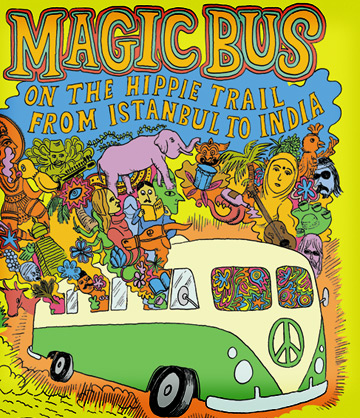 by Frank Bures, WorldHum: http://www.worldhum.com
by Frank Bures, WorldHum: http://www.worldhum.comNo-one knows exactly how many people in the 1960s and ‘70s set out on the hippie trail from Istanbul through Iran, Pakistan and India, and on to Kathmandu.
Some think as many as 2 million seekers traveled the route in search of some kind of enlightenment.
Regardless, beginning in 1962, when Allen Ginsberg landed in India, and ending in 1979, when the Iranian revolution shut down a big swath of it, the hippie trail was dotted with young Western travelers.
They were, as Rory MacLean puts it, “the first movement of people in history traveling to be colonized rather than to colonize.” In other words, they were traveling to have their minds blown and their lives transformed.
A few years ago, MacLean set out on the trail to see what had become of it and to explore the history of a movement that forever altered the travel world. The result is his fantastic account, Magic Bus, just released in the U.S.
I asked him via email about the Beatles, Middle Earth and how to find a trail of one’s own.
World Hum: You write that the hippies, or Intrepids, as you call them, followed in the footsteps of the Grand Tourists of the 1800s and before. How do the two groups compare?
Rory MacLean: After the Napoleonic Wars young Englishmen, for the most part wealthy Romantics, traveled in their numbers to Rome and Greece, then the crossroads of Classical and contemporary culture. On horseback, by bone-rattling carriages and in the shadow of the Pantheon, their experiences established the concept of travel as a means of gathering knowledge, as well as an adventure of the Self.
Like the hippies who followed them a century and a half later, the Grand Tourists looked abroad for models for political reform and a free-love alternative to Christianity. Both groups aimed to learn and extract pleasure from the Foreign. Most of all they traveled to be transformed.
It seems that one of the things that pushed people out on the hippie trail was a desire to embrace life in the fullest possible way. Would you say that’s true?
Absolutely. In the ‘60s kids grew up with the world. It was the era of Kennedy, civil rights marches and the pill. Most of all it was an age of amazing technological progress. Everything seemed possible. All of which convinced young people that by changing themselves they could change the world. That lucky post-war generation had the chance to imagine a world without boundaries. They abandoned their parents’ Kingdom Come of postponed pleasure to catch hold of the living, transient world.
I was surprised that you met so many people along the way who were on the original hippie trail - travelers either trying to track down memories, or who never really left.
For most Intrepids, the trip was the journey of their life - the experience of their life. Just consider how they traveled. A few flew directly to India, but the majority drove east from Europe. War-surplus Jeeps, retired Royal Mail vans, fried-out VW campers, rainbow-colored London double deckers, clapped-out Turkish coaches. I even heard of a Scotsman who drove a Messerschmidt bubble car to India. It was the weirdest procession of unroadworthy vehicles ever to roll and rock across the face of the earth.
I was lucky when researching “Magic Bus.” In Istanbul I met the original Flower Child. In Pakistan I broke bread with a one-time dope-smoking Catholic who converted to Islam and became an imam - because of Bob Dylan.
In Rishikesh I met the Beatles’ doctor. But last year when the book was published in Britain, and the first reviews appeared in the press, something even more amazing happened. Trail “veterans” started writing to me by the dozen.
They’d headed east in the ‘60s or ‘70s and - motivated by reading the book - now embarked on a new trek, up the stairs to the attic to unearth old boxes and dusty journals.
Within a couple of months I’d been sent over 500 photographs, and enough new material to write the book all over again. With their permission I started relaying those stories, along with those I’d already collected, in articles and talks. I even built the www.magicbus.info website - with a Flickr page - to create a meeting place for this community of Intrepid travelers.
A couple of those people mention Middle Earth and “The Hobbit” in the book. I’m wondering how influential those books were as far as inspiring people to set off on their own adventures.
In the ‘60s, books - and song lyrics - were central to communicating ideas. Lyrics inspired, guided - or in some cases misguided - the search for a new way of living, expressing genuine concern for the state of the world.
On the road, books were passed freely between travelers, in keeping with the ‘60s’ openness to new experiences. Top reads included More’s Utopia, Kafka’s The Metamorphosis and Huxley’s Brave New World.
Dog-eared copies of the novels of Hermann Hesse and Tolkien went back and forth from West to East countless times, as did Ginsberg’s “Howl,” Kerouac’s On the Road and especially Henry David Thoreau’s Walden.
“I went into the woods,” he wrote of 19th-century Massachusetts, “because I wished to live deliberately, to front only the essential facts of life, and see if I could not learn what it had to teach, and not, when I came to die, discover that I had not lived.” The same spirit of discovery - including self-discovery - defined many ‘60s travelers’ quests.
To read further, go to: http://www.worldhum.com/features/travel-interviews/rory-maclean-magic-bus-qa-20090112/N2/
No comments:
Post a Comment